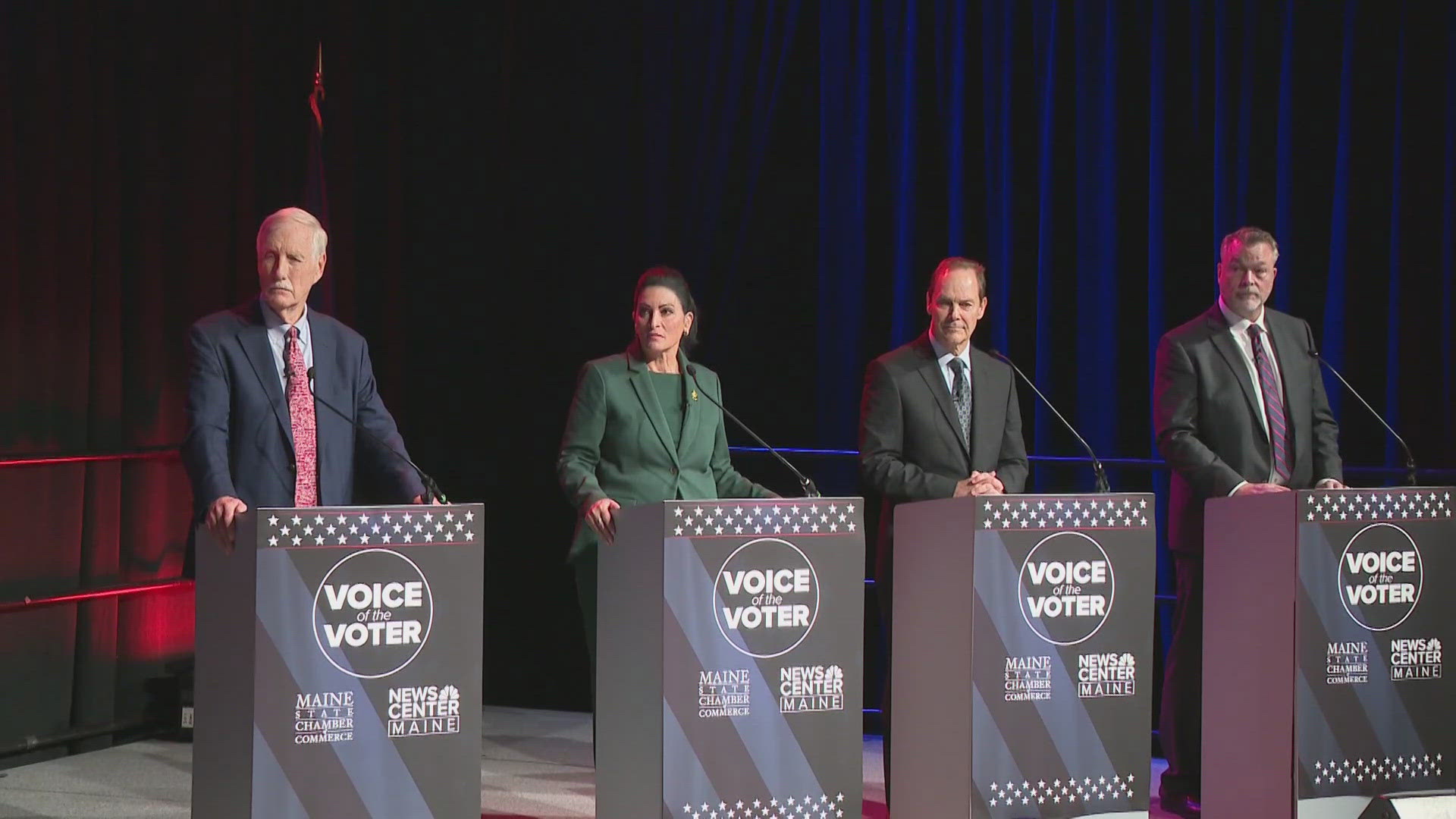AUGUSTA, Maine — The four candidates in Maine's U.S. Senate race met for their second debate Wednesday, taking the stage at the annual meeting and dinner of the Maine State Chamber of Commerce at the Augusta Civic Center.
Independent incumbent Senator Angus King, Republican Demi Kouzounas, Democrat David Costello, and independent Jason Cherry kept things cordial, largely refraining from attacks while finding common ground on several key issues.
Cost of living
NEWS CENTER Maine’s Rob Caldwell moderated the debate and began the night asking the candidates for solutions to address the high cost of living.
King, the former Maine governor seeking his third term in Washington, was quick to blame a lack of competition between businesses as a driver of high costs.
“One of the mistakes I think the federal government has made over the past thirty years is taking its foot off the gas in enforcing the anti-trust laws,” King said. “Competition is the best way to control prices.”
Kouzounas, a U.S. Army veteran and dentist, took aim at President Joe Biden's administration, arguing that its support for the American Rescue Plan Act and Inflation Reduction Act fueled inflation on the tail end of the pandemic.
“All of those things basically heated up the market and threw a lot of money in the pockets. People started spending and you had inflation,” Kouzounas said.
Costello, a Democrat who has served in various roles in government, argued for the government to increase the federal minimum wage.
Independent Jason Cherry, an attorney and former FBI special agent, agreed with King’s push for private sector competition and, as the discussion moved to the deficit, offered a forceful rebuke of federal spending.
“I think the federal government is drunk off of tax money and the first thing for an AA is to admit you’ve got a problem,” Cherry said, referring to the sobriety organization Alcoholics Anonymous.
Worker shortage
Asked about the shortage of workers many industries in Maine are confronting, the candidates appeared to find consensus around the role of legal immigrants in filling vacant roles.
“Why don’t we open up and have more legal immigrants come to the United States," Kouzounas, whose parents immigrated to the U.S. from Greece, said. "Instead of one million per year, let’s have three million per year."
King emphasized a bill he proposed with Sen. Susan Collins in the Senate to reduce the time asylum seekers must wait to receive work authorization. King believes these immigrants will help to keep businesses fully operational.
“We’re not talking about costing Americans jobs; we’re talking about preserving American jobs,” King said.
Abortion
All four candidates seemed supportive of federal protections for abortion, though they differed in their approach.
Costello and King called for the codifying of protections of Roe V. Wade under federal law.
“A woman’s rights to have control of her reproductive future should not rest on her zip code,” King said.
Cherry expressed support for a plan to allow abortions up until a certain number of weeks in a pregnancy at the federal level—which he suggested could be anything from 15 weeks to 24 weeks—while giving the states the power to expand that to later in a pregnancy.
Kouzounas, who describes herself as “pro-choice” waffled between support for this plan and support for codifying Roe.
In a difficult-to-understand answer, Kouzounas appeared to call Cherry’s idea of states expanding upon a federal minimum “probably correct,” adding, “I do believe in pro-choice, and I do believe that Roe v. Wade covers that, allowing the states to come in and make decisions later on in the pregnancy.”
Kouzounas’ stance on abortion at the debate is a departure from her views earlier in the campaign. In an interview with NEWS CENTER Maine in June, Kouzounas agreed with the overturning of Roe V. Wade, saying, “I think we need to have it come back to the states so we can go ahead and look at it again.”
Electoral College
Of all the issues discussed during the debate, many of the liveliest responses from the candidates came on the topic of the Electoral College—the system for electing U.S. presidents that relies on the allocation of electoral votes from each state, rather than a count of the total number of votes nationwide.
King called for an end to the system, saying it is “a gun pointed at the head of democracy,” and throwing his support behind the popular vote to decide presidential elections.
“It's ridiculous. We’re watching this election, and nobody is paying attention to Maine or California or New York. All the attention is to six or seven states,” King argued.
Costello agreed and said that scrapping the Electoral College is just one part of a larger reform agenda that needs to take root.
“It’s obscenely undemocratic for the person who gets the most votes in a representative democracy to actually lose,” Costello said.
Cherry and Kouzounas argued on keeping the Electoral College in place and emphasized its importance in giving electoral power to rural states.
“I think it was meant to be the way it is,” Kouzounas said. “The Electoral College vote is meant to allow some voice in these states that do so much for us.”
Cherry added, “The Electoral College was meant to balance the power between small and medium states.”
The U.S. Senate race in Maine will be decided by ranked-choice voting. The winner will serve a six-year term in Washington.
For more information on Election Day in Maine, click here.

